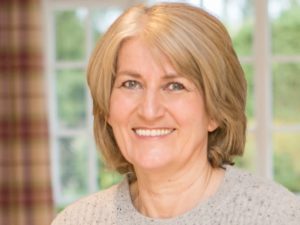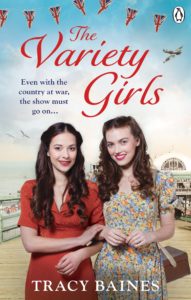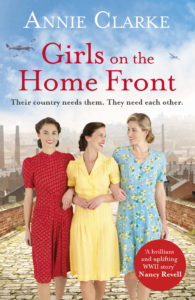I’ve always wanted to write novels, but it felt overwhelming, and to be honest, I didn’t have the confidence to dive into something so all encompassing – so I wrote articles and short stories. I’m so glad I did something – other than procrastinate. I learnt so much from writing short stories: brevity, character, structure and so on. It’s the same skills – you just need more stamina if you’re writing a novel. Gosh, I never knew how draining sitting down all morning could be.
I could always find the time for a short story and it taught me that I could finish things. Finishing is so important. I’ve lost count of the times I’ve heard people say they’ve got loads of beginnings. If you’re struggling, I’d say choose one thing and keep going until you finish it. My short stories have been published in magazines various magazines in the UK and abroad.
At the moment I’m working on the Christmas with the Variety Girls – the sequel to The Variety Girls which was published by Ebury Press in February 2020.
I always write straight to my computer but I make a huge amount of notes by hand. I also go back to writing by hand if I get stuck and can’t get the words flowing. I don’t know why it works, but it does. Most mornings I’ll write a page of A4 of free flow. It’s like a warm-up to get the motor running and I find I can express myself more easily when I do this.
Daydreaming is important to me too. I play around with ideas for as much time as I can before I begin to write. I’ll read a lot of books for background details and research, and some of that will inspire a character or a scene. My books are set in the Variety Theatre during WW2 and I love reading books about old theatre and music hall stars to get creative thoughts flowing.
When I start writing I tend to stick with one character and work out what she wants most of all. Then I work out what could stop her getting it. Gradually all the other characters and events start to pop into my head. I make a synopsis, then develop a plan or outline which will change as I go along. It’s like having a road map. I can take detours here and there, but I always have a road to go back to. I’ve found this stops me from panicking about where I need to go next.
I try to work for a few hours each morning, actually writing, but I’m thinking about it most of the time. I might work in the evening if I’ve had a disrupted day. I tend to write more when I’m past the middle point. Some days are better than others. But if I’m having a bad day I’m happy as long as I get something down that moves the story forward. I know I can always go back and fix it. Again, the short stories helped me because I am not afraid of deleting huge parts of text to get to the nub of the story
Early in my career I was lucky enough to be mentored by Margret Graham – who also writes as Milly Adams and Annie Clarke. I’ve learnt an enormous amount from her and also from reading her many books. I am loving her latest – Girls on the Home Front series. She is a superb teacher and if you ever get chance to get to one of her workshops crawl there if you have to. She’s also written two books that are brilliant in explaining things such as show and tell etc. No waffle, just practical advice and instruction – and plenty of exercises. You learn how to write by writing – you have to do the work – but having someone wonderful to mentor you makes such a difference.
Margaret’s explanation of structure took me time to understand. It’s very simple but there is such depth to it. It is foremost in my mind when I sit down to work out my novels: normal world, point of change, a rising arc of tension, crisis point or darkest moment, the slipper test, resolution. If you want to know more I can highly recommend The Writers Springboard. She describes structure so simply.
When the writing’s going well there’s nothing like it. It must be what drugs are like. I forget time and am totally in my little world. And when a character arrives unannounced and tells you their story. Sublime. The difficult part is maintaining the momentum when the words aren’t flowing. It’s turning up at the desk, day after day, in the hope that this will be the day it all starts making sense.
My advice for other writers would be not to think you’re too old, not clever enough, thin enough, rich enough. Have confidence, work hard but most of all enjoy it. It will shine through in your writing.



